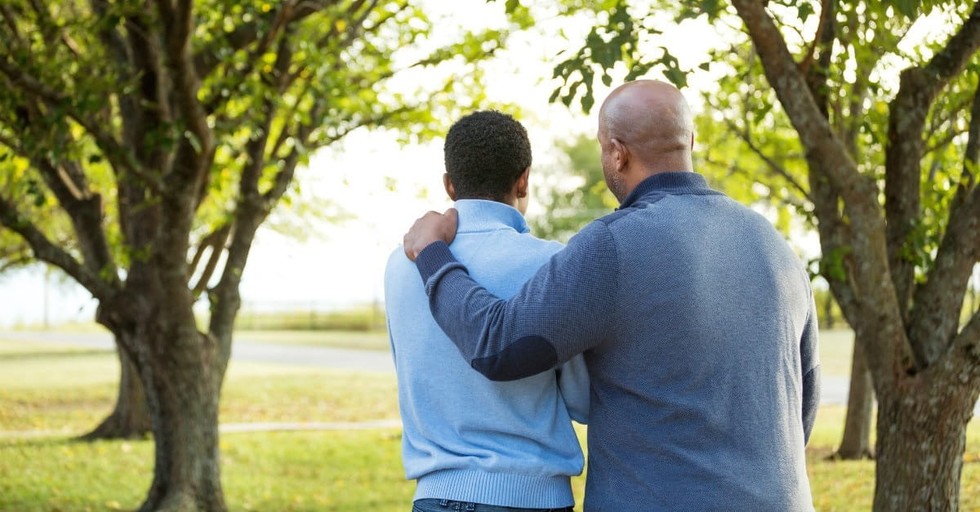10 Important Steps to Help Children Navigate Grief
- Lisa Appelo
- Updated Jun 13, 2017

Six years ago, I went to bed married and woke up a widow and single mom to seven. When my husband passed away suddenly, our family shattered. While it was hard enough to work through my own grief, I was crushed that my kids had so much to grieve.
As much as we want to, we can’t fix the pain for our children. But we can create a safe place for their questions. We can pray for patience when they have hard days. And we can seek wisdom and insight to walk with them through grief.
Though kids can seem resilient to loss, it’s important for them to process the pain so they can heal. How can we help them? Here are 10 important steps to help children through grief, whether they have lost a sibling, grandparent, friend, or parent.
Photo credit: ©Thinkstock/AntonioGuillem
-
![1. Let them grieve at their pace, in their way.]()
1. Let them grieve at their pace, in their way.
Slide 1 of 10This is the starting place. “Everyone grieves differently,” someone graciously told me after my husband’s death. Preschoolers grieve differently than teens, and teens grieve different from adults.
Make sure children know they have grace to grieve on their own terms. Some kids need to talk; others process privately. Some may be clingy or irritable; others aloof or seemingly unaffected. The timeline for grief may be different for each one in the family.
Photo credit: ©Thinkstock
-
![2. Keep the conversation going.]()
2. Keep the conversation going.
Slide 2 of 10Initiate conversation with kids even if they don’t. Some children are uncomfortable talking about feelings. Older kids may feel they are burdening an already-burdened parent by sharing their sadness. It’s important to initiate conversation and be available whenever your children need to talk.
I’ve often done this naturally in our conversations: "Daddy always loved this restaurant" and "Do you remember the time Daddy..." are bridges to talk about loss. We’ve also read books on heaven and loss together to help keep the conversation going.
Photo credit: ©Thinkstock/m-gucci
-
![3. Tell special stories of loved ones.]()
3. Tell special stories of loved ones.
Slide 3 of 10One way to keep an ongoing conversation is by sharing favorite memories. My kids love hearing about their dad’s childhood, our dating, his work, and early family stories. Photo albums help us remember favorite times together. Stories not only help my younger kids know their dad, but also who we are as a family.
Collect stories from family members and friends to share with your children. Proverbs 17:22 says a cheerful heart is good medicine. Triggering smiles and belly laughs through storytelling is deeply healing, and the stories will one day become warm memories.
Photo credit: ©Thinkstock/patat
-
![4. Keep the family routine and rules.]()
4. Keep the family routine and rules.
Slide 4 of 10Keeping the same routine and rules after loss helps provide security for children. It signals you’re still as much a family as before the loss. With so many changes, family routine and rules provide a comforting rhythm.
When it comes to discipline, distinguish age-related misbehavior from grief-driven behavior. Close friends and family helped me see this distinction. In one instance after talking with my mom, I realized my son’s behavior was typical for a boy his age and didn’t stem from grief. It was actually a relief and helped me know how to correct him.
Photo credit: ©Thinkstock/Jupiterimages
-
![5. Let them grow into their grief.]()
5. Let them grow into their grief.
Slide 5 of 10Adults are usually all consumed by grief and gradually ease out of it as they heal. Children, on the other hand, grieve in spurts. Their grief is more compartmentalized and helps them resume school and other activities. My son seemed fine as he played like other neighborhood kids all afternoon but then cried each evening in the quiet of bedtime.
And while adults understand the full breadth of loss, kids will experience new grief as they grow and realize their loss on a deeper level. A 14-year-old may grieve a sibling in a way she couldn’t at four years old. Months or years later, your child may experience a fresh wave of grief.
Photo credit: ©Thinkstock/digitalskillet
-
![6. Don't let them bury it.]()
6. Don't let them bury it.
Slide 6 of 10Not talking about our deceased loved one won’t avoid grief; it just postpones it. When kids and teens don’t fully process the loss, they can get stuck, only to have the grief surface later. It’s important our children know it’s okay to feel sad and to cry. It’s expected to experience a period of sadness – which the Bible calls lament. Ecclesiastes 3:4 says there’s a “time to weep... and a time to mourn.”
Bereavement counselors may be able to help your child talk about their loss. See whether GriefShare or a hospice organization offers a support group or grief camp in your local area. Parents shouldn’t assume quiet means okay. Make sure children avoid the hard conversations and feelings altogether.
Photo credit: ©Thinkstock
-
![7. Address any fears.]()
7. Address any fears.
Slide 7 of 10After the death of someone close, kids and teens will often begin to fear their own death or a parent’s death. As we answer their questions and talk through their fear, we need answer honestly and point them to biblical truth.
This issue came up for us when I least expected it. We were driving home after a weekend away, radio on and everyone in great spirits when my son blurted out, “I don’t want to die like Daddy!” Turning off the radio, I addressed it head on. I told my kids none of us knows when we’ll die but assured them believers spend eternity with God. Later, we looked up Scripture on what happens to us after death and what heaven is like. We also read several books for both my older and younger kids on heaven.
Photo credit: ©Thinkstock/Wavebreakmedia Ltd
-
![8. Address any guilt.]()
8. Address any guilt.
Slide 8 of 10Kids can also feel guilty as they grieve. One of my teens wondered if she could have helped medically to prevent her dad’s death. Kids may feel guilty they are still living while a sibling or friend has died.
Make sure your child knows they didn’t cause the death. Assure them that God is sovereign and that He alone is in control of life and death. Psalm 139:16 says “all the days ordained for me were written in your book before one of them came to be.”
Photo credit: ©Thinkstock
-
![9. Create tangible keepsakes.]()
9. Create tangible keepsakes.
Slide 9 of 10This is a practical way to help your child grieve and preserve memories. It may be as simple as a framed picture or an album of pictures. A friend had a teddy bear made from clothes for her young children. Another friend had a quilt made from special t-shirts.
Older kids may cherish something special like a watch or Bible their loved one used. One of my boys wears a necklace with his dad’s name on dog tags while my daughter loves having her dad’s surfboard. If your children are old enough, you might ask them to choose something special to remember their loved one.
Photo credit: ©Thinkstock/digitalskillet
-
![10. Take care of yourself.]()
10. Take care of yourself.
Slide 10 of 10If you’re shepherding a child through grief, you’ve also probably suffered a loss. It’s doubly hard to navigate your own loss while you help children through grief. Parenting grieving children takes enormous time, emotion, and energy. It was often just as I headed to bed that one of my teens suddenly wanted to talk, or in the middle of a family celebration when my 4-year-old clung to me in tears.
Take care of yourself by eating well and getting enough sleep. More than ever, it’s important to carve out daily time in the Word and in prayer with the Lord. Let God nourish you with the riches of His word so that, in turn, you’re able to meet the challenges and emotions of helping your children through their grief.
Photo credit: Pexels.com



 Previous
Previous








